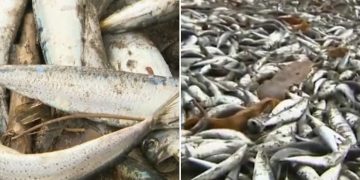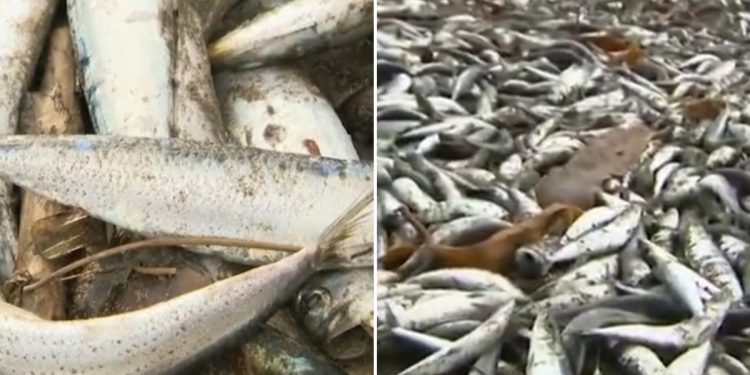Dead fish covered a Japanese beach for nearly a mile three months after authorities began the release of radioactive water from the damaged Fukushima nuclear plant.
The fish were mostly sardines, but some mackerel were included in the “thousands of tons” that the U.K.’s Daily Mail said washed up on the northernmost main island of Japan, Hokkaido, Thursday morning.
[firefly_embed]
[/firefly_embed]
Similar instances of dead fish washing ashore occurred this summer on the coasts of Texas and Thailand, according to reports from NPR and CNN at the time. In both of those cases, scientists blamed climate change.
“Water can only hold so much oxygen at certain temperatures, and certainly we know that seawater temperatures are rising,” Katie St. Clair, the manager of the sea life facility at Texas A&M University at Galveston, told NPR at the time of the Texas incident. “It is concerning and something that needs to be monitored.”
Since warmer water holds less oxygen, it can support fewer fish, Quintana Beach County Park official added. The effect can be even more pronounced in shallower water.
In Thailand, Thon Thamrongnawasawat, deputy dean of the Faculty of Fisheries at Kasetsart University, told CNN that higher ocean temperatures caused more plankton blooms, which in turn lowers ocean oxygen levels.
“Various natural phenomena, such as coral bleaching or plankton bloom, have naturally occurred for thousands to tens of thousands of years,” told the outlet. “However, when global warming occurs, it intensifies and increases the frequency of existing phenomena.”
While Japanese officials could not explain Thursday’s , one researcher provided the Daily Mail with a number of possibilities.
One of those would be similar to the Texas occurrence, in which it was posited that the fish in that case were unable to “breathe” in relatively shallow water along the beach.
The fact that sardines move in “densely packed schools” could have exacerbated the effect of the coast of Japan, Takashi Fujioka, a Hakodate Fisheries Research Institute researcher, suggested to the Daily Mail.
A sudden move from warmer to colder water during migration could have shocked the fish as well, Fujioka theorized.
It’s also possible that some larger predator chased the sardines to the point of exhaustion, he said.
“We don’t know for sure under what circumstances these fish were washed up, so I do not recommend eating them,” Fujioka added.
While the incident occurred only months after the release into the ocean of treated radioactive water from the Fukushima plant, there is nothing to link the two.
The previous occurrences in Texas and Thailand happened not only far from Fukushima, but before officials began releasing the treated water back into the ocean.
Moreover, similar events have occurred before even in Japan, but also before the radioactive water was released.
“[A]n undersea tunnel is being used to discharge the radioactive water treated by the Advanced Liquid Processing System, which uses a process called isotopic dilution to render the water less dangerous,” the Daily Mail reported Friday. “This process sees tritium — a less harmful radioactive isotope — added to the contaminated water which is subsequently mixed with ‘clean seawater,’ diluting the concentration of more harmful substances.”
Japanese officials have argued all along that the treated water is safe, though some critics have noted the lack of “long-term data” on the effects of tritium on ocean life, the outlet reported.
This article appeared originally on The Western Journal.
















 Continue with Google
Continue with Google